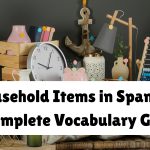Studying false cognates between Spanish and English is really interesting. It shows how tricky and detailed learning a language can be. These tricky pairs, like ‘actual’ in Spanish which means ‘current’ and ‘actual’ in English which means ‘real’, often lead to mix-ups. These can be funny sometimes but can also cause bigger mistakes. Understanding these word traps better not only helps you get better at Spanish, but also shows how languages keep changing.
So, what’s going on in our brains when we learn and use languages with these tricky words? And how can learners avoid these traps? Let’s think about some practical ways to handle these challenges.
What Are False Cognates in Spanish?
False cognates in Spanish, also known as ‘false friends,’ are words that look a lot like English words but mean something very different.
For instance, if you say ’embarazada’ thinking it means ’embarrassed,’ you’re actually saying ‘pregnant.’
Another mix-up happens with ‘librería,’ which sounds like ‘library’ but really means ‘bookstore.’
It’s important to know these differences to avoid confusion and communicate clearly when speaking Spanish and English.
| Spanish Word | Actual Meaning in Spanish |
|---|---|
| Actual | Presente, en este momento (Current) |
| Asistir | Acudir a un lugar o evento (To attend) |
| Carpeta | Una funda para guardar documentos (Folder) |
| Colegio | Escuela secundaria (High school) |
| Embarazada | Estado de gestación (Pregnant) |
| Fábrica | Lugar donde se producen bienes (Factory) |
| Librería | Tienda donde se venden libros (Bookstore) |
| Molestar | Causar incomodidad o irritación (To bother) |
| Sopa | Comida líquida caliente con ingredientes variados (Soup) |
| Suceso | Un evento o acontecimiento (Event) |
Sound Like a Native: Cuban Slang & Vocabulary Guide.
What Are The Types Of Cognates?
Cognates are words in different languages that look and sound similar because they come from the same root. We can split them into three types: true, partial, and false.
True cognates are the easy ones; they look almost the same and mean the same thing across different languages. Then you have partial cognates. They’re kind of like distant cousins. They seem similar and share some meanings, but they also have their differences.
Lastly, there are false cognates. These are the tricky ones. They might trick you because they look and sound alike, but their meanings are totally different.
Cognates come in different categories:
- True Cognates – These are words that look alike and mean the same thing in both languages. Example: “actor” in English and Spanish.
- False Cognates – These are words that look similar but have different meanings. Example: “sensible” (means sensitive in Spanish, not reasonable).
- Loanwords – These are words borrowed from one language into another, often with slight changes. Example: “taco” in English comes from Spanish, while “jeans” (pronounced “yins”) is commonly used in Spanish but borrowed from English.
Common false cognates between Spanish and English
Knowing how true and partial cognates work helps us understand some tricky words between Spanish and English.
For instance, the English word ‘assist’ means to help, but in Spanish, ‘asistir’ means to attend.

Another example is ‘carpet’ in English, which is something you put on the floor, while ‘carpeta’ in Spanish means a folder.
Keeping these in mind can help us avoid mixing them up.
| Spanish Word | English Meaning | Spanish Meaning |
|---|---|---|
| Actual | Actual | Current |
| Asistir | Assist | To attend |
| Carpeta | Carpet | Folder |
| Colegio | College | High school |
| Constipado | Constipated | Having a cold |
| Contestar | Contest | To answer |
| Decepción | Deception | Disappointment |
| Desgracia | Disgrace | Misfortune |
| Embarazada | Embarrassed | Pregnant |
| Éxito | Exit | Success |
| Fábrica | Fabric | Factory |
| Grosería | Grocery | Rudeness |
| Introducir | Introduce | To insert |
| Largo | Large | Long |
| Librería | Library | Bookstore |
| Mayor | Mayor (of a city) | Older |
| Molestar | Molest | To bother |
| Noticia | Notice | News |
| Oficio | Office | Trade/profession |
| Parientes | Parents | Relatives |
| Realizar | Realize | To achieve |
| Ropa | Rope | Clothes |
| Sensible | Sensible | Sensitive |
| Sopa | Soap | Soup |
| Suceso | Success | Event |
Additional False Cognates
When you’re diving into Spanish, it’s crucial to spot the false cognates – those tricky words that look familiar but aren’t what they seem. Take ‘actual,’ which really means current, not real.

Or ‘decepción,’ which means disappointment, not deception. Getting these right not only helps you avoid mix-ups, but it also gets you closer to the culture and the subtle shades of the language.
| Spanish Word | English Meaning | Spanish Meaning |
|---|---|---|
| Advertencia | Advertisement | Warning |
| Arena | Arena | Sand |
| Asistir | Assist | To attend |
| Biblioteca | Bibliography | Library |
| Bombero | Bomber | Firefighter |
| Campo | Camp | Countryside |
| Carpeta | Carpet | Folder |
| Casualidad | Casualty | Coincidence |
Crack the Code of Spanish Words That Start with V.
Spanish cognates: How to avoid mistakes
To cut down on mistakes while learning Spanish, it’s key to spot the difference between words that look alike but aren’t (false cognates) and those that are true friends in meaning. Dive deep into where these words come from and what they really mean.
Use dictionaries aimed at language learners and chat with people who’ve spoken Spanish since they were kids. Keeping an eye on how words change in different situations helps a lot.
This way, you can dodge common errors and get better at Spanish, step by step.
- Double-check meanings – If a word looks familiar, look it up before using it.
- Learn words in context – Seeing words in sentences helps you remember their true meaning.
- Use mnemonic devices – Associate tricky words with something funny or memorable. For example, imagine a pregnant (embarazada) woman looking embarrassed—that’ll stick!
- Practice with native speakers – They’ll correct you in real time and help you sound natural.
- Keep a list of common false cognates – Review them regularly so you don’t make the same mistakes.
Conclusion
Understanding false cognates in Spanish and English is key for clear communication. These words might look similar, but they mean different things in each language.
This can lead to mix-ups. Knowing these words well helps you speak and write more clearly.
So, it’s important to really focus on these words if you want to speak both languages fluently and avoid mistakes.
Take Your Language Skills to the Next Level with Lingua Viva!
Born in Cali, but raised in London, Juan Pablo has led an interesting life. He has an undergraduate degree in Foreign Language and 10+ years of experience. Juan Pablo has taught and worked as a professor and interpreter in Spanish, English, and French languages. He prides himself on having a ‘situational teaching style’, which means he caters lessons to fit student needs. He is serious about teaching, responsible, professional, clear, and concise.











